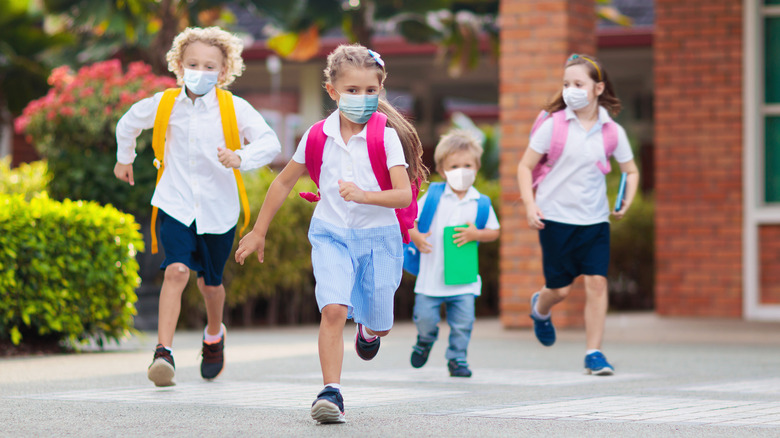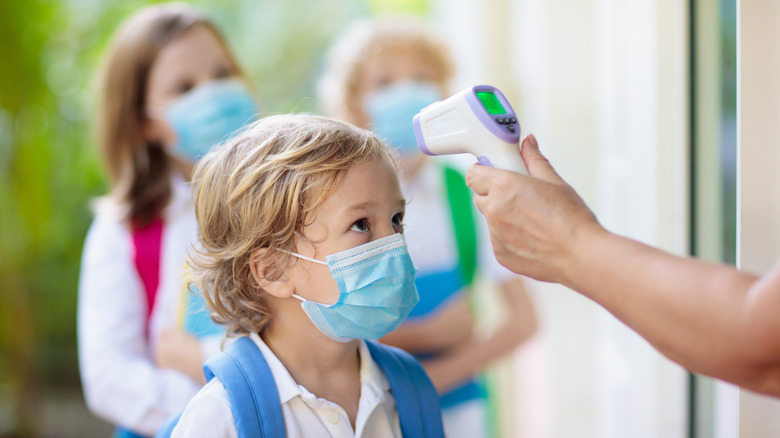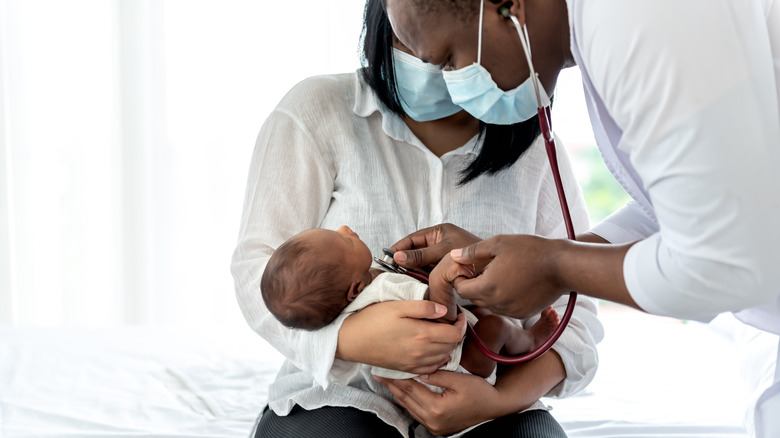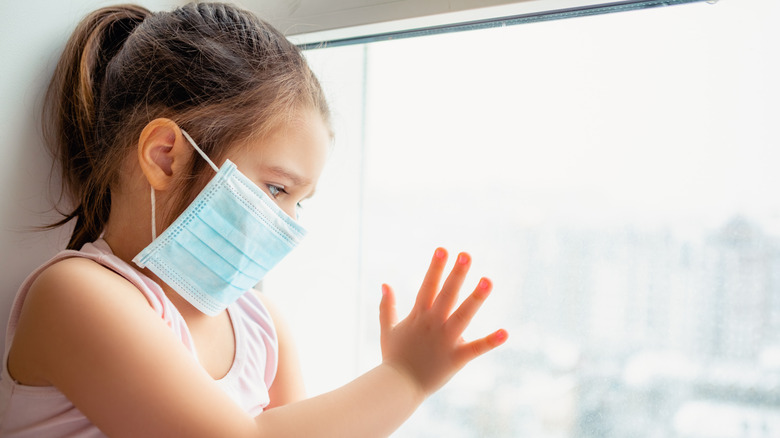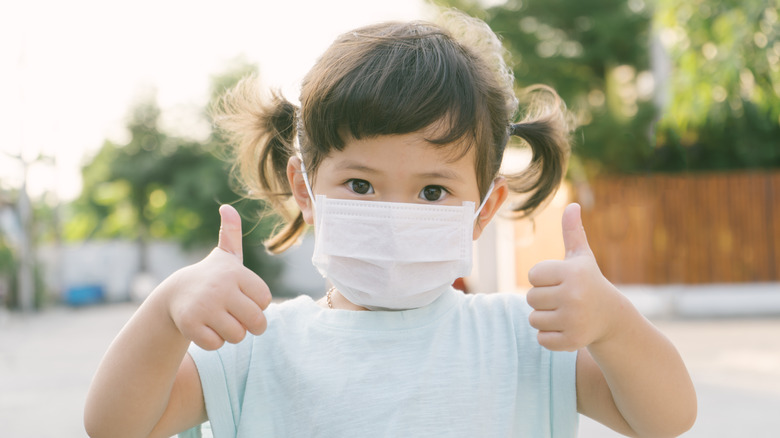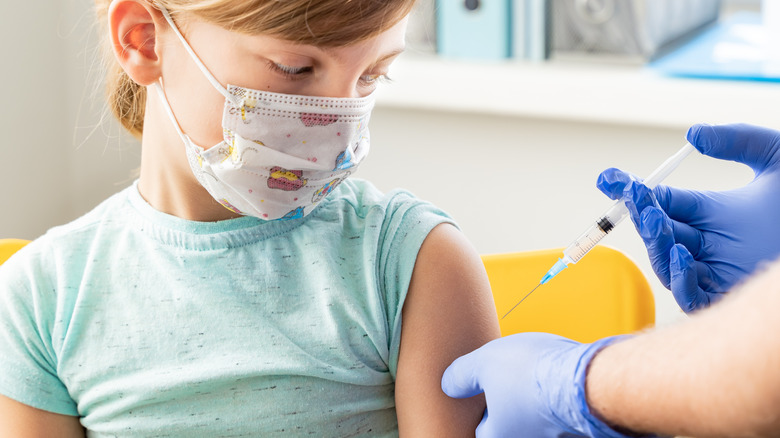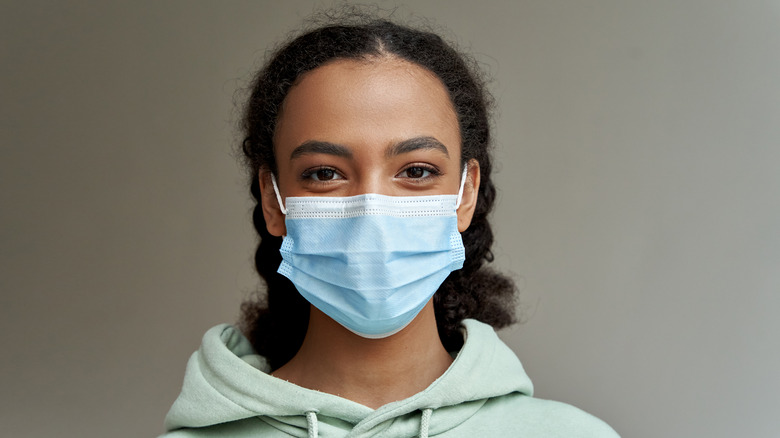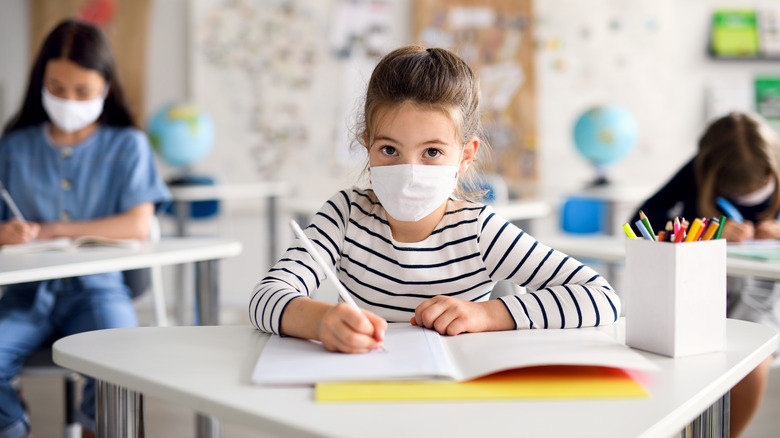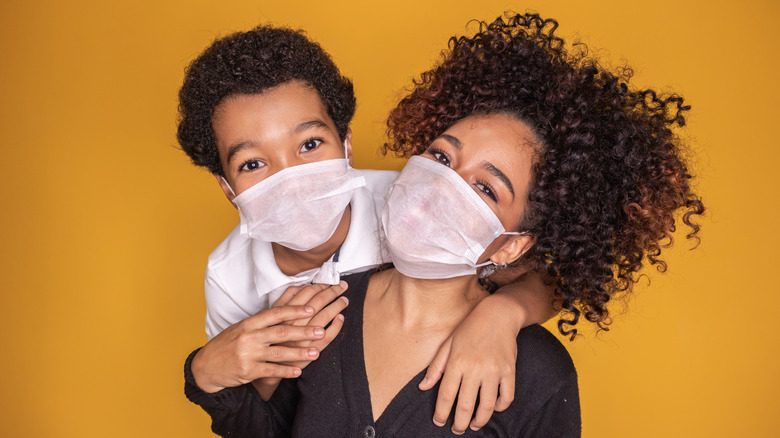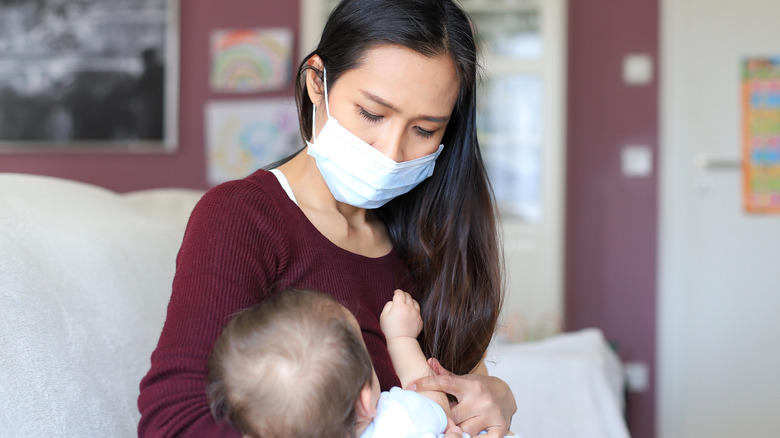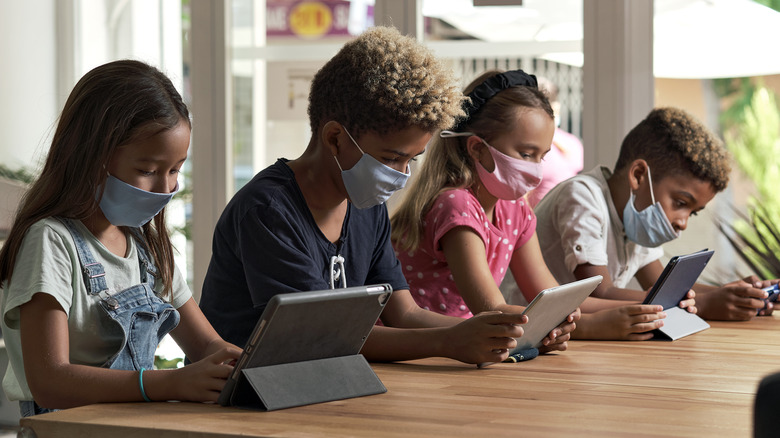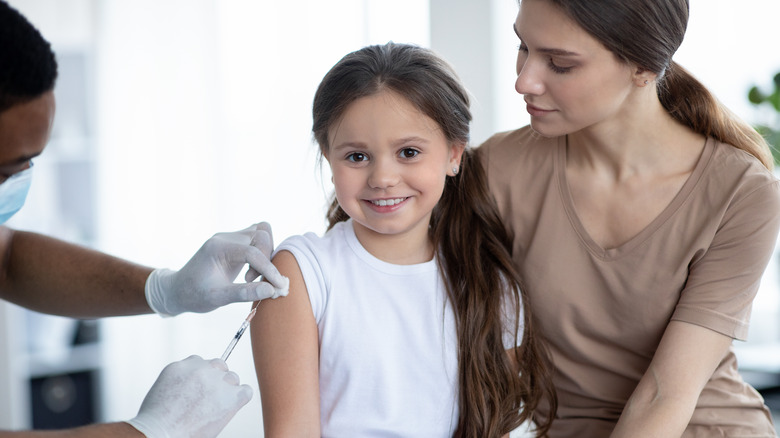Everything To Know About How COVID-19 Can Affect Children
News of the COVID-19 pandemic swept around our pale blue dot nearly as fast as the virus itself. And while it's been well over a year since the COVID-19 pandemic began — not that we're counting — misinformation continues to abound and many people have been left scratching their heads over the virus itself, subsequent vaccines, and public restrictions. This seems to be especially true based on how unsure parents are feeling about coping with COVID-19 on behalf of their children (via AP News).
Since the pandemic began, over 4.59 million children have tested positive for COVID-19, according to an American Academy of Pediatrics statement released on August 19, 2021. "After declining in early summer, child cases have increased exponentially ... rising from about 38,000 cases the week ending July 22nd to 180,000 the past week," the statement confirmed.
Not sure where to begin? Here's a look at how the virus can impact children.
Is COVID-19 prevalent among children?
Simply put, kids can, and do, get COVID-19. Children have been testing positive for COVID-19 since the beginning of the pandemic (via American Academy of Pediatrics). The onset was summer was met with happiness and a huge decline in COVID-19 cases. Unfortunately, cases of the virus among children have begun to increase exponentially, with over a four-fold increase within the last month, according to the American Academy of Pediatrics.
However, as of this writing, the American Academy of Pediatrics says that the incidence of severe illness among children with the virus is low. And over the course of the pandemic so far, children have made up a mere 14.6% of total cases nationally. During the third week of August, cases involving children spiked to 22.4%.
Thankfully, the incidence of childhood deaths due to COVID-19 is incredibly low, with a maximum of 0.03% mortality rate among children in the United States, the American Academy of Pediatrics explained. However, more research is needed to determine the long-term effects of the virus.
But what about babies?
While older kids are pretty unlikely to develop complications due to COVID-19, children under one year of age may be more vulnerable to severe illness and complications, explained the Mayo Clinic. Babies, newborns in particular, have immature immune systems and less developed airways. These two things combined could spell disaster if they are exposed to COVID-19. Since babies' airways aren't as strong, a viral respiratory infection could result in severe breathing problems. Newborn babies can easily become infected by caregivers, especially right after delivery. Unsurprisingly, the Mayo Clinic strongly recommends wearing a clean, cloth mask and hand washing when caring for a newborn.
As a side note, if you don't already know to wash your hands before handling a newborn baby, take this as a minor bit of life advice: As the king Larry David demonstrated in "Whatever Works," singing happy birthday twice is the best way to ensure your hands are clean. Bonus points if you sing it aloud.
How likely is it that my children will get COVID-19?
The data surrounding COVID-19 is ever-changing, so it is difficult to nail down the exact chances of your child contracting the virus (via American Academy of Pediatrics). Furthermore, the risk of your child becoming infected has a lot to do with the social situations they find themselves in. Their chances also heavily rely on the responsibility of other parents to keep their children home if they suspect they might be infected (via NPR).
During the week of August 19, 2021, more than 180,000 cases were reported throughout the United States, Puerto Rico, and Guam (via American Academy of Pediatrics). So, the virus is spreading at a pretty quick clip from child to child. But the leading experts have yet to discover why COVID-19 seems to affect children differently than adults, according to the Mayo Clinic. Additionally, children who are already battling health issues, such as asthma, diabetes, obesity, or heart complications may have an increased risk of severe illness.
Should I cancel my children's playdates?
As parents would no doubt attest, the COVID-19 pandemic has been a real routine-disrupter. According to Harvard Health, many children who become infected with COVID-19 do not exhibit symptoms. And when they do, the symptoms are often far more mild than in adults, making them less perceptible. Recent studies are showing that more children than we originally thought are spreading the virus and that the lack of in-your-face symptoms might contribute to the risk. This is why "it's best to minimize playdates, or to limit them to a couple of children or families with whom you have been socializing during the pandemic," Harvard experts advised.
Instead, you may want to spend more time playing games as a family. Harvard Health helpfully recommends inciting some casual activities like games of corn hole and badminton. "You can still go for family hikes or bike rides where you're around to enforce social distancing rules," the site explained.
Can I set up outdoor playdates instead?
While it is safer to gather outside, the risk of contracting and spreading the COVID-19 virus still exists al fresco. However, outdoor playdates that follow social distancing guidelines are a great compromise. The risk of contracting the virus outside at a distance is low, especially with masking and hand sanitizer aplenty (via Harvard Health). That said, virtual playdates (think: FaceTime, Skype, or Zoom) are currently considered to be the safest way to socialize and indoor playdates with multiple different families are the least safe (via WebMD).
Harvard Health advises parents to discuss COVID-19 with their children in ways that do not feed into the anxieties surrounding it. They explained that if your children understand the boundaries that need to be followed to stay safe during a playdate then outdoor playdates can be relatively safe. However, if your children cannot realistically follow the guidelines, it is best to opt out (per Harvard Health).
Are COVID-19 vaccines available for children?
Can children be vaccinated against COVID-19? As of August 25, 2021, the Mayo Clinic released a slew of new information surrounding the newly FDA-approved Pfizer vaccine and more. Unfortunately, the answer to this burning question is ... yes and no.
The Pfizer-BioNTech COVID-19 vaccination is available for children ages 12 to 15 (via Mayo Clinic). And the CDC recommends that all children over the age of 12 get vaccinated when available. According to this same release by the Mayo Clinic, research surrounding this vaccine shows it is 100% effective in preventing COVID-19 in 12- to 15-year-olds. In people 16 and older, the same vaccination is 91% effective in preventing severe illness caused by the virus (via Mayo Clinic). In fact, "the immune response in the vaccinated adolescent group was even stronger than that in vaccinated 16- to 25-year-olds enrolled in an earlier study," according to Harvard Health.
As of this writing, children under the age of 12 are ineligible to receive any of the FDA-authorized or FDA-approved COVID-19 vaccines; however, vaccine makers are compiling data on children under 12 so this is subject to change (via NBC News).
What kinds of symptoms do kids typically experience with COVID-19?
Children may find that COVID-19 expresses itself in their bodies much the same way as the virus begins presenting in adults (Mayo Clinic). However, the symptoms tend to be a bit milder and the recovery process quicker (via Mayo Clinic).
When infected with COVID-19, children might have symptoms similar to those they experience when they have a cold. These symptoms can include nasal congestion, cough, sore throat, difficulty breathing, muscle and body aches, and fever and chills, explained the Mayo Clinic. In more extreme cases, children might experience stomach pain, poor appetite, diarrhea, nausea, vomiting, and of course, a new loss of taste and smell.
If you suspect your child may be infected, the Mayo Clinic recommends quarantining your child and getting them tested for COVID-19. The experts further recommend encouraging the child to use a separate bedroom and bathroom if that is available, as a bit of space can help to decrease transmission. It is important to remember that not all children exhibit symptoms of the virus when infected. This is why it is so important to follow the guidelines for preventing the spread.
What are the long-term health consequences for children with COVID-19?
While many of the long-term consequences of COVID-19 remain a mystery, some effects have been becoming more notable. However, it is important to take this information with a grain of salt. It is incredibly difficult to know the long-term health repercussions of a virus that has only been widespread since 2020 (via Mayo Clinic).
One of the biggest red flags that has been reported in children is a higher incidence of multisystem inflammatory syndrome (MIS-C). This is a serious condition that can cause inflammation in parts of the body that do not perform well under inflamed conditions, according to the Mayo Clinic. Many of the children who have recently been diagnosed with MIS-C had previously been infected by the COVID-19 virus. The findings suggest that MIS-C is caused by an excessive immune response to the COVID-19 virus.
Some emergency symptoms that require immediate attention include the inability to wake up or stay awake, difficulty breathing, severe stomach pain, and a pale, gray or blue color in the skin, lips, and nail beds (via Mayo Clinic).
Should I be worried about adverse reactions to the COVID-19 vaccine?
As mentioned, much of the research regarding the COVID-19 vaccine and children is ongoing. However, there have been a few reports of heart inflammation following the vaccination. According to Harvard Health, the number of heart inflammation cases in adolescents and young adults is "higher than expected" but still very rare and unlikely.
As of July 2021, there were 1,047 reports of myocarditis (aka heart inflammation) in people under 30 who had received the vaccine. This condition was most commonly found in males between the ages of 16 to 24. It has also been reported that most people who've experienced myocarditis after being vaccinated against COVID-19 have had mild cases and recovered quickly, explained Harvard Health.
Harvard Health states that side effects like this one are of the utmost importance when it comes to children, which is part of the reason why the FDA has not yet approved the vaccine for children younger than 12 years old. Despite the rare occurrence of adverse reactions, it is still recommended that all eligible children receive the vaccine to help develop herd immunity and to protect from the seemingly more dangerous delta variant (via Harvard Health).
Why are adults eligible for the vaccine but kids aren't?
It is not unusual for vaccines to be developed for use in adults before they are made and okayed for use in children. As USA Today detailed, "Traditionally, drugs are studied first in adults and then move to adolescents, then children, then younger children, as they are proven safe and effective in each group." Additionally, COVID-19 poses a greater risk to the adult population.
As of this writing, the clinical trials in younger children are underway and look promising. Pfizer, Johnson & Johnson, and Moderna are all making their way through the rounds of testing on children under the age of 12. Pfizer-BioNTech is confident that their clinical trial including 5- to 11-year-olds should conclude in fall 2021 (via USA Today). Additionally, Pfizer says its studies involving children younger than 5 will be completed in early 22, per USA Today.
Is the delta variant more easily transmitted?
The delta variant has emerged rapidly and is proving to be more contagious than previous iterations of the virus. And yes, it is more easily transmitted, according to the CDC. In fact, CDC director Rochelle Walensky revealed that the delta variant is twice as contagious as the original virus (via MarketWatch). The greatest concern is for unvaccinated individuals, as the variant has a higher likelihood of causing severe illness in such ones (via CDC). In adults, the delta variant has been linked to a higher incidence of hospitalizations and death.
Until vaccines become available to children under 12, it's wise to take precautions (via USA Today). This includes getting yourself vaccinated. "COVID-19 vaccines reduce the risk of people getting COVID-19 and can also reduce the risk of spreading it," the CDC advised. Encourage members of your family who are eligible for a vaccine to get vaccinated, too. Additionally, encourage your children to practice proper hand-washing, mask-wearing, and social distancing whenever possible.
Are COVID-19 vaccine dosages the same for children and adults?
In 12- to 15-year-old adolescents, the COVID-19 vaccine dosage is the same as it is for adults, USA Today confirmed. However, the dosage for younger children will likely be reduced. Adults and adolescents who get the vaccine are receiving 30 microgram doses. As of this writing, 10-microgram doses are being studied for use in 5- to 11-year-olds. For children younger than five years old, 3-microgram doses are in the works (via USA Today).
If you're considering getting your child vaccinated with a readily available adult vaccine, you should reconsider. "Legally, now that the Pfizer-BioNTech vaccine has received full FDA approval, doctors can prescribe it to anyone, including young children," USA Today revealed. However, this is strongly advised against by the FDA and other experts alike due to the potential risk of side effects from incorrect dosages.
If you are pregnant, you may be at a higher risk of severe illness if you contact COVID-19. Therefore, it is advisable for pregnant women to receive the vaccine for their own protection. Additionally, antibodies from the vaccine can be transferred to a breastfeeding infant via breastmilk, which can help bolster the infant's immune system (via Harvard Health).

